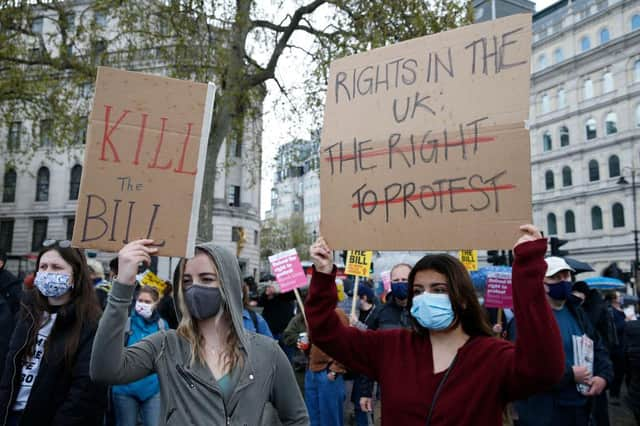Priti Patel describes controversial anti-protest legislation as ‘modest reset’ of police powers


The Home Secretary has said she intends to push ahead with unpopular curbs on protest, despite significant opposition.
Priti Patel described the proposals - which include plans to give police in England and Wales more powers to impose conditions on non-violent protests judged to be too noisy - as a "modest reset" of police powers.
Advertisement
Hide AdAdvertisement
Hide AdIntroducing the fourth day of the debate on the Queen's Speech on Monday, Ms Patel also told the Commons she wanted an "institutional overhaul" in how violence against women is treated following the death of Sarah Everard.
The MP for Witham told MPs: "In recent years we have seen some protesters and groups use increasingly disruptive tactics. These are a drain on the public purse and results in police forces having to move officers away from their regular responsibilities.
"Protesters' rights must be balanced against the rights of everyone else to go about their daily lives and we are therefore introducing a modest reset of the police powers for the effective management of highly disruptive protests.
"It will uphold the right to freedom of speech and assembly while ensuring that people can go to work, ambulances are unhindered and the free press can function unimpeded."
Advertisement
Hide AdAdvertisement
Hide AdLabour shadow home secretary Nick Thomas-Symonds said the right to protest is a "precious part of our democracy that should be treasured, not trashed".
Opening the debate - titled safe streets for all - the Home Secretary also said nobody "should be made to feel unsafe when walking our streets" and underlined the "terrible, terrible" case of Ms Everard.
Marketing executive Ms Everard, 33, went missing as she walked home from a friend's house in Clapham, south London, on March 3.
A major police investigation was launched and her body was found a week later in woodland in Kent.
Advertisement
Hide AdAdvertisement
Hide AdMs Patel explained: "I want to see an institutional overhaul in Government and society's response to violence against women and girls.
"It was tragically and horrifically underlined by the death of Sarah Everard earlier this year. That terrible, terrible case prompted an outpouring of grief and sharing of experiences across the country from women and girls.
"So, let me be crystal clear: no-one - no-one at all - should be made to feel unsafe when walking our streets. No-one should feel the need to speed up when they hear footsteps behind them, no-one should have to be on the phone or pretend to be on the phone to deter potential attackers."
‘Criminals have never had it so good’
Meanwhile, Labour accused the Government of being "soft on crime and soft on the causes of crime", and said their "failure" was having a "devastating impact on people's lives".
Advertisement
Hide AdAdvertisement
Hide AdMr Thomas-Symonds told MPs: "The truth is that under this Government, criminals have never had it so good.
"It is little wonder the statistics are so dire with the huge cuts the Government has made to policing."
He continued: "Of course, I welcome more police on our streets but the Government's uplift programme won't even replace the officers lost since 2010. And what about the police staff lost as well who play such a vital role?
"The harsh reality is that this Government's failure has had a devastating impact on people's lives."